2024 Q3 Blockchain Commons Report
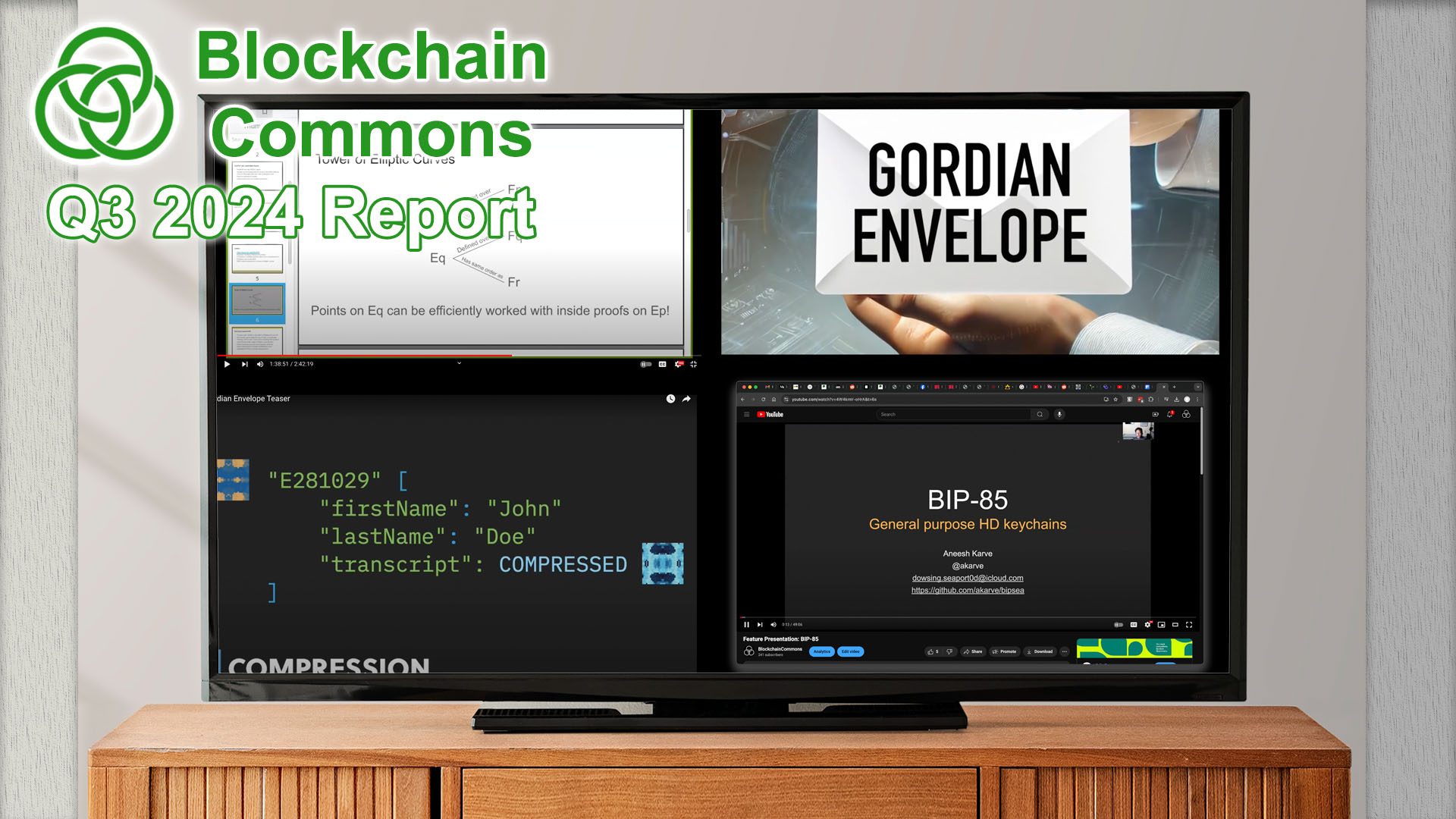
Blockchain Commons’ work to create open, interoperable, and secure digital infrastructure continued in Q3 2024. Here were some of our main topics of interest:
- Gordian Envelope
- Videos
- TPAC
- dCBOR & Unicode
- Seed Recovery
- BIP-85
- SSKR for Ledger
- FROST
- FROST Implementers Meeting
- FROST in Gordian
- Stack Wallet
- Reference Upgrades
- Gordian SeedTool for iOS 1.6.2
- Swift 6 Stack Upgrade
- More Envelope Signatures in Rust
- Developer Resources
- Stack Organization
- New Envelope Pages
- What’s Next?
Gordian Envelope
Gordian Envelope, Blockchain Commons’ privacy-preserving data-interchange format for data at rest and (using GSTP) data on the wire, remains one of our top priorities. This quarter, we worked to make it more accessible and explored new cases for its usage.
Videos. We produced a trio of videos to offer an introduction to Gordian Envelope: a teaser, an overview, and a look at extensions. They’re must-watch viewing if you’re interested in adopting a data-storage and data-interchange format that actually focuses on privacy.
|
Envelope Teaser:
|
Understanding Envelopes I:
|
Understanding Envelopes II:
|
Presentations at W3C TPAC (Technical Plenary and Advisory Committee): We’ve worked extensively on using Gordian Envelope to store digital assets such as seeds and SSKR shares. At TPAC 2024 this year, we presented some new thoughts on using various Envelope and CBOR alternatives in the rechartered DID group, where Christopher is an Invited Expert. We also discussed using Gordian Envelope for some specific DID use cases, which we hope to explore more. There’s more in the minutes and the slides.
dCBOR & Unicode. Gordian Envelope is built on dCBOR, our deterministic CBOR profile. In Q3, we updated our dCBOR Internet-Draft to v11. This was to incorporate Unicode Normalization Form C (NFC), to ensure that Unicode strings, used for all text in Gordian documents, will always be deterministic.
Seed Recovery
The safe storage and recovery of seeds has long been a focus at Blockchain Commons, because it’s the heart of #SmartCustody. Our August 7th Gordian Developers Meeting focused on the topic and gave community members the ability to talk about their own efforts.
-
BIP-85. Aneesh Karve presented on BIP-85. This is a methodology for deriving many secrets from a single seed.
-
SSKR for Ledger. SSKR has been one of Blockchain Commons’ most successful releases because it allows developers to safely use Shamir’s Secret Sharing. Aido has incorporated SSKR into Ledger Seed Tool, which now allows you to shard your Ledger secrets yourself (without depending on Ledger Recovery and Ledger’s privacy-busting KYC-compliant partners).
|
Seed Recovery:
|
BIP-85:
|
SSKR for Ledger:
|
Our Gordian Developer community is one of our most important resources to ensure that we’re doing work that meets the needs of wallet developers. Sign up for our Gordian Developer announcements to get the latest info on our upcoming meetings!
FROST
FROST is an up-and-coming multisig method that takes advantage of Schnorr-based signatures and Multi-Party Computations (MPCs) for key generation and signing. It’s an important new technology for creating keys that are more resilient and more secure. We’ve been supporting it for more than a year now.
FROST Implementers Meeting. Our second FROST Implementers Meeting occurred on September 18th. It gave people working on FROST specs, libraries, and cryptography the ability to talk about their most recent challenges. We’ve got a full record of the event, including videos, slides, summary, and transcript. It was great to bring the community together and plan for the future!
ChillDKG: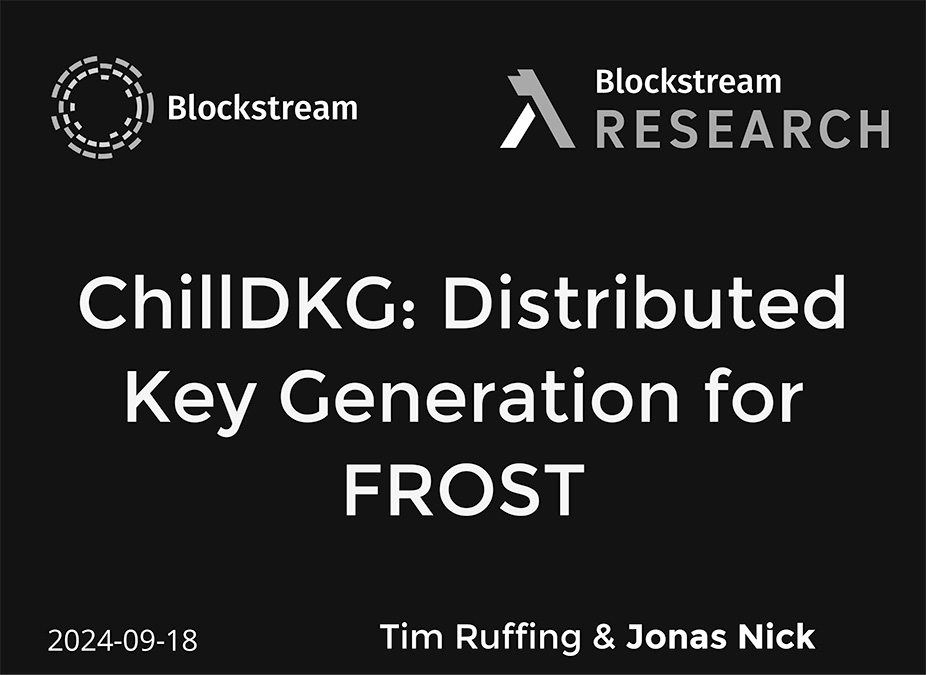
|
FROST Federation: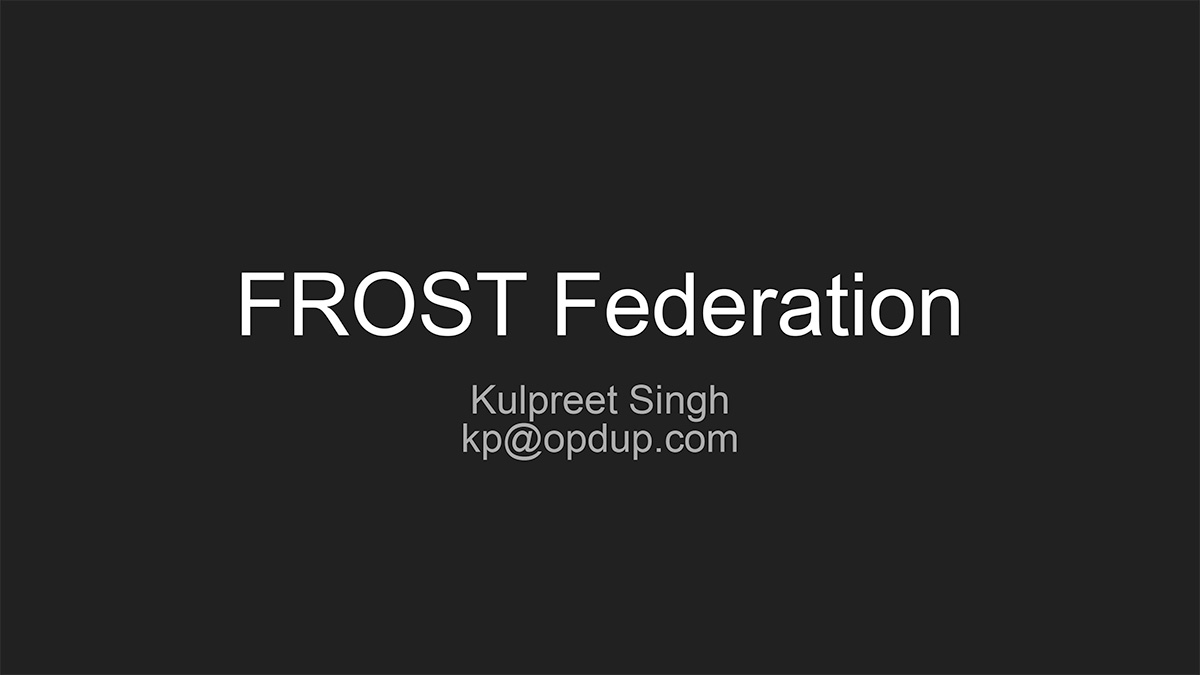
|
secp256k1-zkp: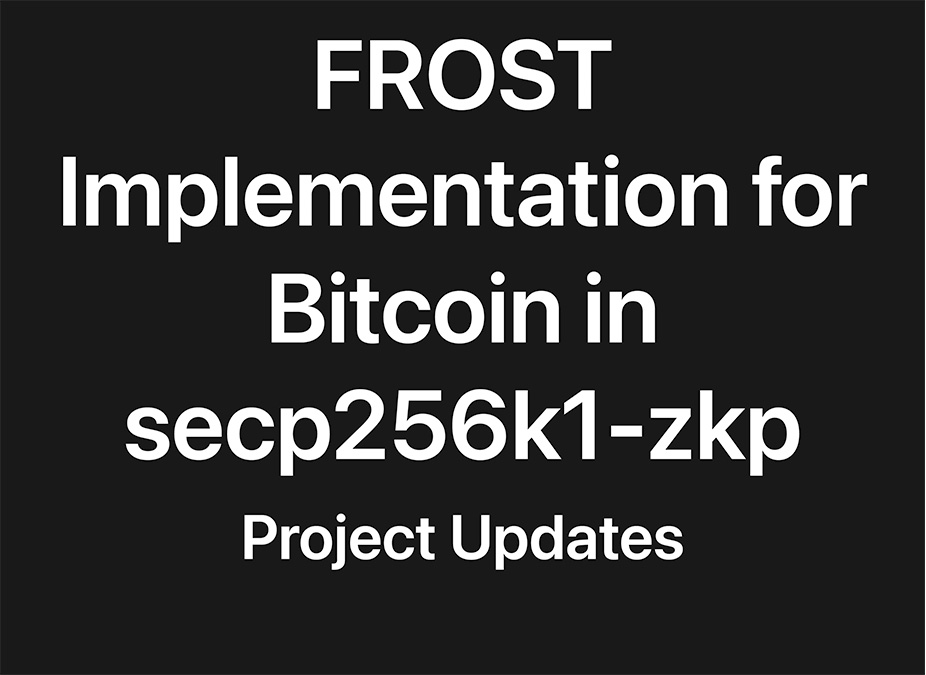
|
Serai DEX: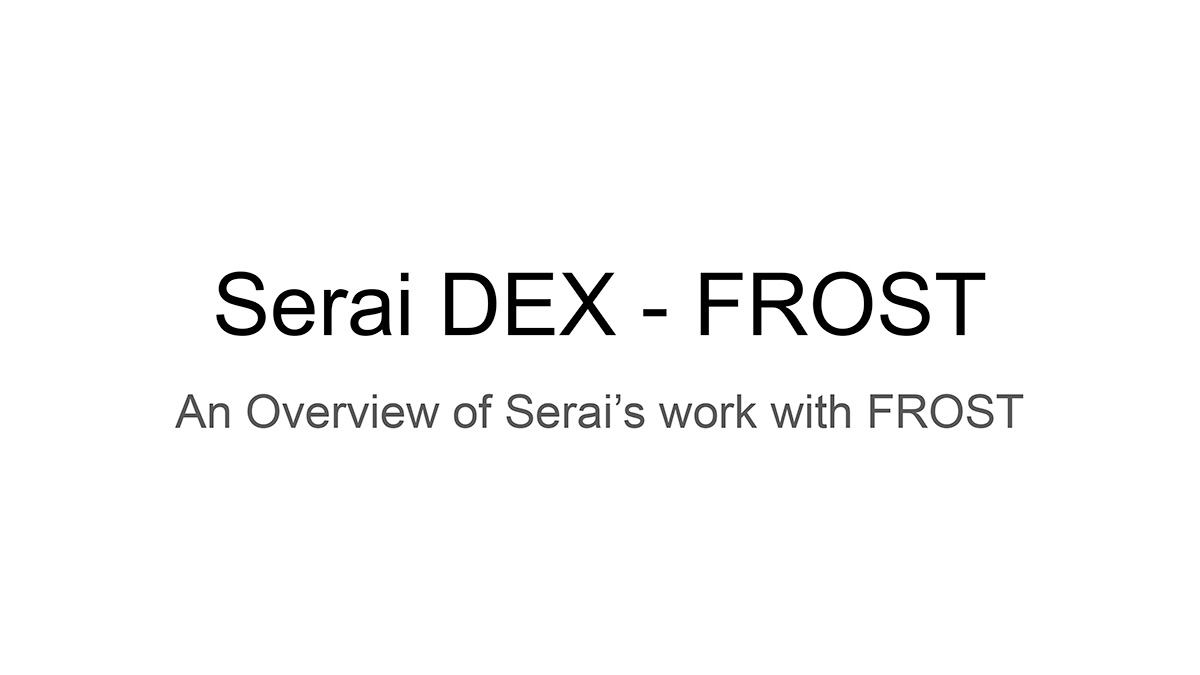
|
FROST UniFFI SDK: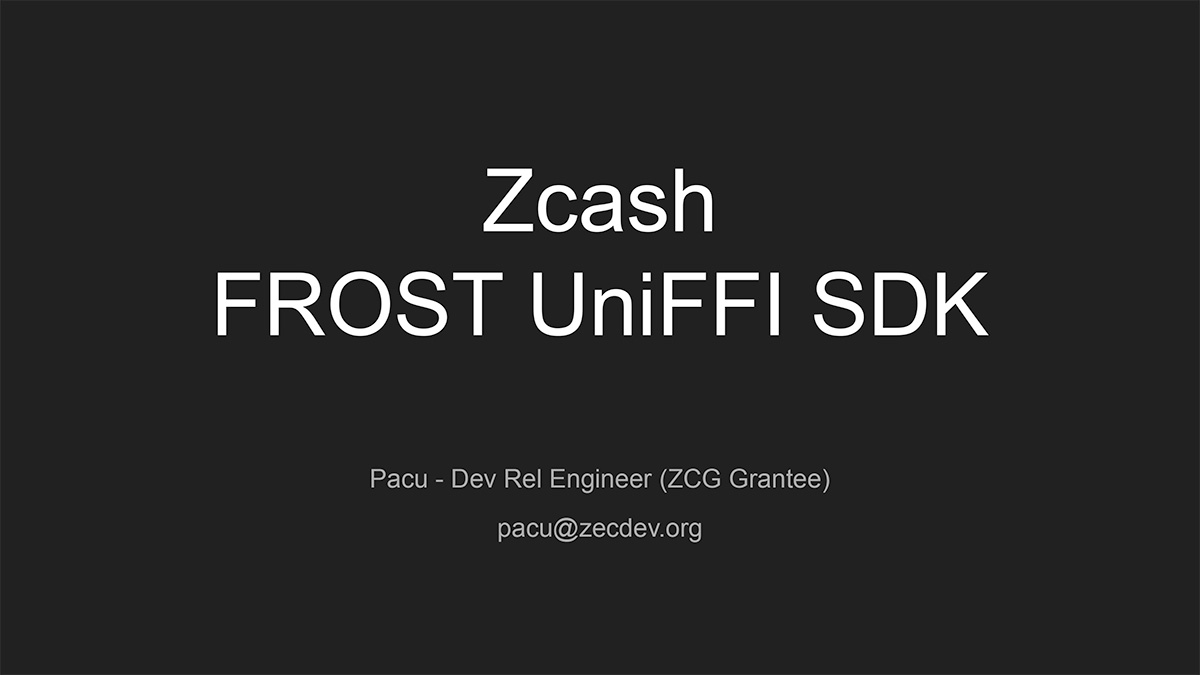
|
ZF FROST Updates: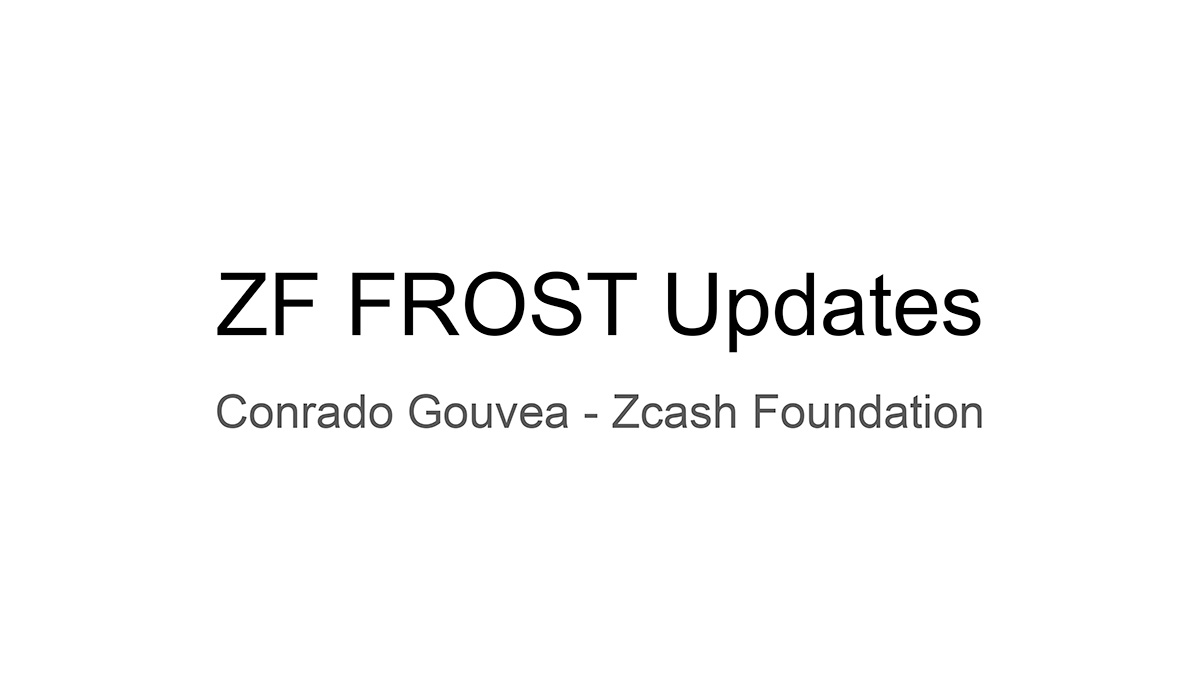
|
FROST in Gordian. We’ve been doing our own work with FROST! Our Rust and Swift Gordian stacks are switching to fully BIP-340 compliant Schnorr signatures. We’ve also been experimenting with FROST support, to allow the FROST signing method using the Trusted Dealer model. We’re waiting on an updated release of the secp256k1 Rust crate so that we can publish our own Rust crates and Envelope-CLI, but we hope to have our full reference implementation available within the month.
Stack Wallet. We did some light review of the Stack Wallet this quarter, which is the first wallet we know of that incorporates FROST. We’d love to see a security review of its FROST design, but from what we can see from usage, it not only implements FROST, but the ability to change thresholds on the fly, which is one of FROST’s rea2lly amazing capabilities.
We will have a FROST Developer’s Meeting on December 4th that will provide advice & support for wallet developers who want to implement FROST. We’ve already scheduled Stack Wallet to give a presentation, since they’ve already done it!
Thanks to The Human Rights Foundation for their support of our FROST work in 2024.
Reference Upgrades
Our reference apps and libraries suggest best-practices and offer examples on the uses of our specifications.

Gordian SeedTool for iOS 1.6.2. We released a minor update of Gordian Seed Tool for iOS that makes our card entropy compatible with other sources, that allows the export of SSKR Envelopes in UR format, and that resolves a few other incompatibilities.
Swift 6 Stack Upgrade. We also upgraded our entire Swift stack to Swift 6. This allows us to take advantage of the Swift 6 concurrency model, remove unnecessary dependencies on forked libraries, and convert the tests of some modules to the new Swift Testing framework. This work can already be found in our Swift libraries, but we’re waiting to release a new Seedtool for iOS until we have other new features to deploy.
More Envelope Signatures in Rust. Fully BIP-340 compatible signatures are just one of our expansions to our Envelope Rust reference libraries. You can now also do Ed25519 signing (again, as soon as we’re able to release our new crates).
Developer Pages
Our Developer Pages are intended to help wallet developers to use our specifications (and other important standards like FROST). If there’s anything you’d like to see that isn’t on the pages, please let us know. This quarter, we made some major updates.
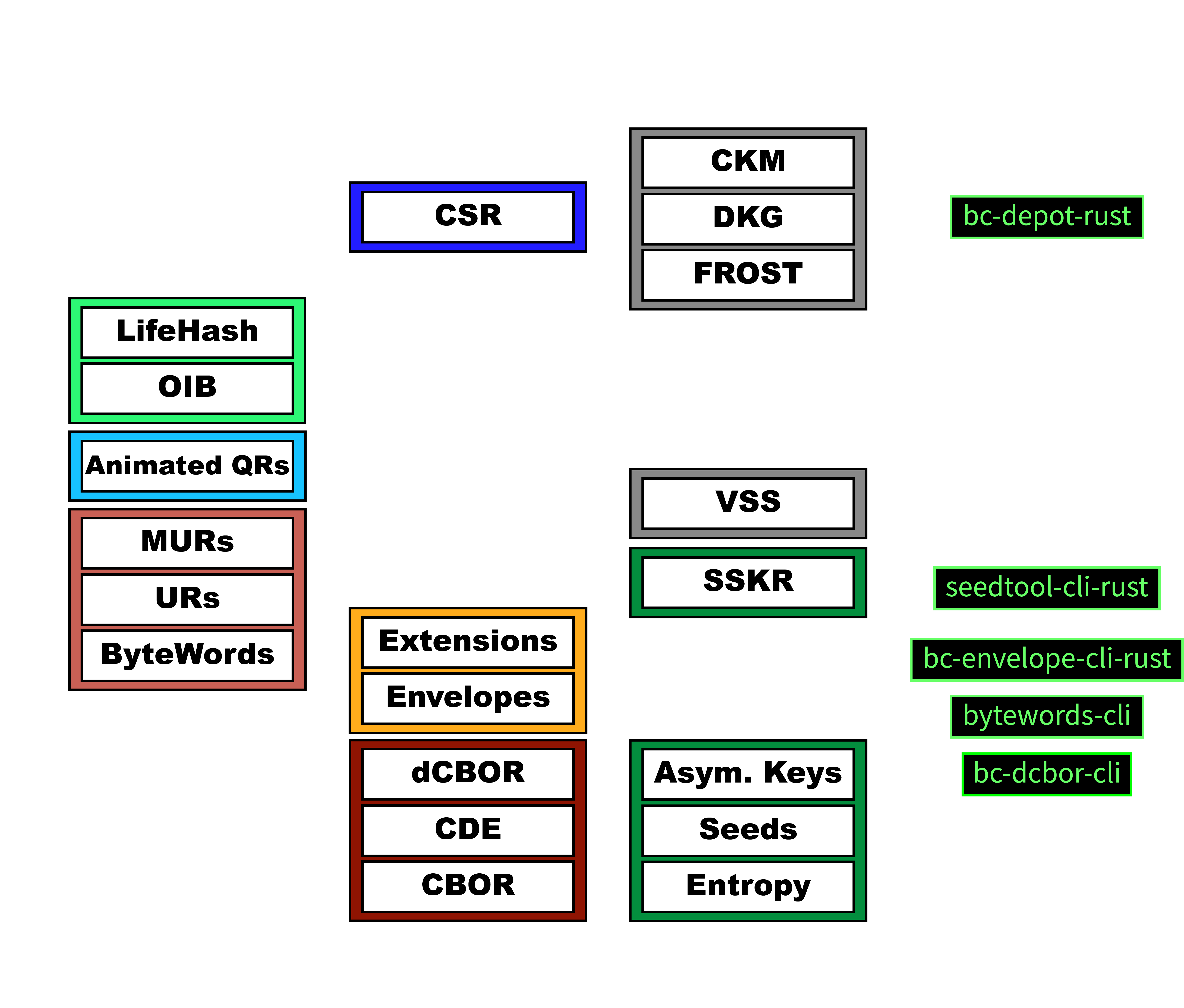
Stack Organization. Our biggest upgrade was a reorganization of the website to focus on the technology stacks that we offer. We have a core stack (which is our fundamental techs like dCBOR and Envelope), a user experience stack (which makes it easier for users to transmit and view data), and a crypto stack (which does the heavy lifting of things like sharding seeds). This is how it all fits together!
New Envelope Pages. Last quarter, we did work on the Gordian Sealed Transaction Protocol. This quarter, we incorporated that into our developer pages, with new content for GSTP and Encrypted State Continuation, plus updates to our look at Collaborative Seed Recovery
What’s Next?
Our most exciting work planned for Q4 my be our December 4th FROST Implementers Meeting. If you are considering incorporating FROST into your own work, please be sure to sign up for our announcements-only Gordian Developers list to receive notifications on the meeting.
Or, our most exciting Q4 work may be our new work on cliques, which we think is an innovative new way to look at identity. We’ve released the first article on the topic, with a few more to come.
We’ll generally be talking with members of the identity and credentials community in Q4, including a presentation at the W3C Credentials Community Group, planned for October 22nd.
We’re also looking to roll out our work on FROST and Ed25519 signing, which just requires the official deployment of an updated secp256k1 Rust crate.
There are more projects under consideration! We’re thinking about producing a “Gordian Companion” to offer a reference for storing SSKR shares. We’re looking into more grants, as funding continues to be poor for many of our partners. (You can help by becoming a sponsor for us at any level!) And of course we’re looking forward to 2025!
TV screen courtesy Freepik.